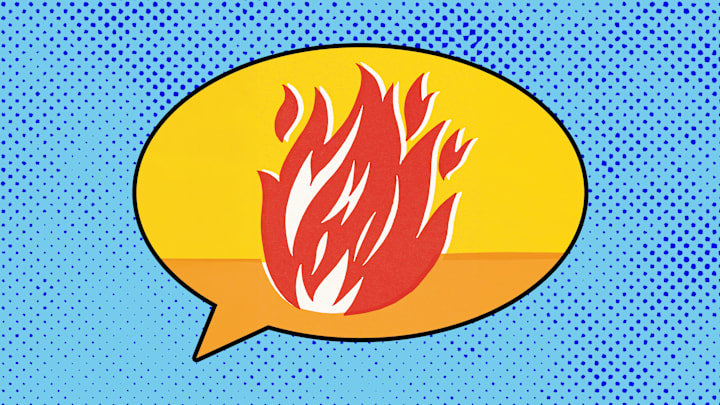The world is heating up, and things are often on fire—literally. As we do what we can to squelch the flames, check out some old and obscure words people of the past used when they wanted to talk all things fire.
1. Pyrosophia
The second half of this word contains the Latin root for knowledge, which fits the definition provided by a quotation from R. G. Mayne’s 1860 work Expository Lexicon Medical Science 1054/2: “Pyrosophia, term for the knowledge of the nature and properties of fire or heat: pyrosophy.” This article could be considered an exercise in lexical pyrosophia.
2. Accendibility
Anything accendible is capable of catching fire, though this term appears to have been born and snuffed out in the 1800s.
3. Bakehead

On a train, a bakehead is the person who takes care of the fire or furnace. This term, dating from the early 1900s, still turns up once in a while in the 21st century, and it can also refer to a pothead.
4. Askefise
An askefise is a fireblower, but not the cool circus-type who spits flame into the air next to a juggler. The Oxford English Dictionary (OED) defines this term as “A person who blows on the ashes or fire,” adding that it was, “used in northern Europe as a term of contempt or reproach for an unwarlike man who stayed at home by the fire.” Ouch. So an askefise was considered a coward, staying home minding the fire instead of going out and taking fire.
5. Ignipotent
Like most words ending with potent, this 17th-century term conveys power—specifically, power over fire. The Human Torch, Johnny Storm, is ignipotent.
6. Soucouyant

This term, which dates back to the 1880s, comes from Caribbean folklore—and sounds like it could be the basis of a horror movie. The OED describes a soucouyant as someone, most often an older woman, who is “believed to shed his or her skin at night and travel in the form of a ball of fire, and to suck the blood of victims while they sleep.” The term comes from French Creole with roots in West Africa that involve evil and sorcery.
7. Glimmering Mort
The OED defines this obscure, 1500s term as “a woman who travels the country begging, saying that she has lost her all [sic] by fire” (for which glimmer was a slang term at that time). The implication is that this story is a load of malarkey, which is supported by the next term.
8. Glim-lurk
Seems safe to say a glimmering mort is a glim-lurker, to use a phrase that popped up later, in the 1800s, and is recorded by Green’s Dictionary of Slang as meaning “the pleading for alms after suffering a supposed fire.” Makes sense that a “supposed” fire is part of a plea for sympathy since it’s one of the most horrifying things that can happen to a person.
9. Church Bucket

Since the 1600s, the term church bucket has referred to a bucket kept in a church—specifically in the choir—in case of fire. Also known as a bucket.
10. Barney Maguire
If your house is on fire, don’t call Barney Maguire. Since the early 1900s, according to Green’s, the phrase has been rhyming slang for fire. Andy Maguire is an Australian term from the 1980s with the same meaning, so beware the whole family.
11. Wait-gleed
A wait-gleed, as defined by the OED, is a Middle English term for “One who sits lazily watching the fire.” This comes from a rare sense of gleed used from around 1300 to around 1650 meaning “to burn.” As with the askefise, hanging around the fire seems to have a lousy reputation.
12. Mizzled

This Scottish term—a variant of measled (as in “infected with measles”) first found in the 1700s—refers to red, blotchy skin that’s been too close to a fire and is thus a bit cooked. You could also describe severely sunburned skin as mizzled, and probably sizzled as well. (And if it’s just your legs that got a little splotchy, that’s mizzle-shinned.)
13. Apyrous
This word stands for a more fortuitous state than mizzled. Since at least the late 1700s, anything labeled “apyrous” has been impervious to fire. Must be nice.
14. Scapulimancy
The beauty of English, and resources like the OED, is affirmative answers to the question, “There’s a word for that?” First found in the OED in the 1870s, scapulimancy is defined as “Divination by means of the cracks in a shoulder blade put into the fire.” (That shoulder blade is definitely not of the living, by the way.) So put this term next to hydromancy, onychomancy, and ophiomancy: divination by means of water, fingernails, and snakes, respectively.
15. Antiphlogistian

Speaking of seriously specific words, the OED dates this term back to a 1791 mention of “antiphlogistian philosophers” and defines their beliefs as “Opposed to the theory of ‘phlogiston,’ or the existence of an element of pure fire.” So if you think pure fire is a bunch of hooey, here’s the perfect word for your latest sidewalk rant or philosophical treatise.
Are you a logophile? Do you want to learn unusual words and old-timey slang to make conversation more interesting, or discover fascinating tidbits about the origins of everyday phrases? Then get our new book, The Curious Compendium of Wonderful Words: A Miscellany of Obscure Terms, Bizarre Phrases, & Surprising Etymologies, out now! You can pick up your copy on Amazon, Barnes & Noble, Books-A-Million, or Bookshop.org.
